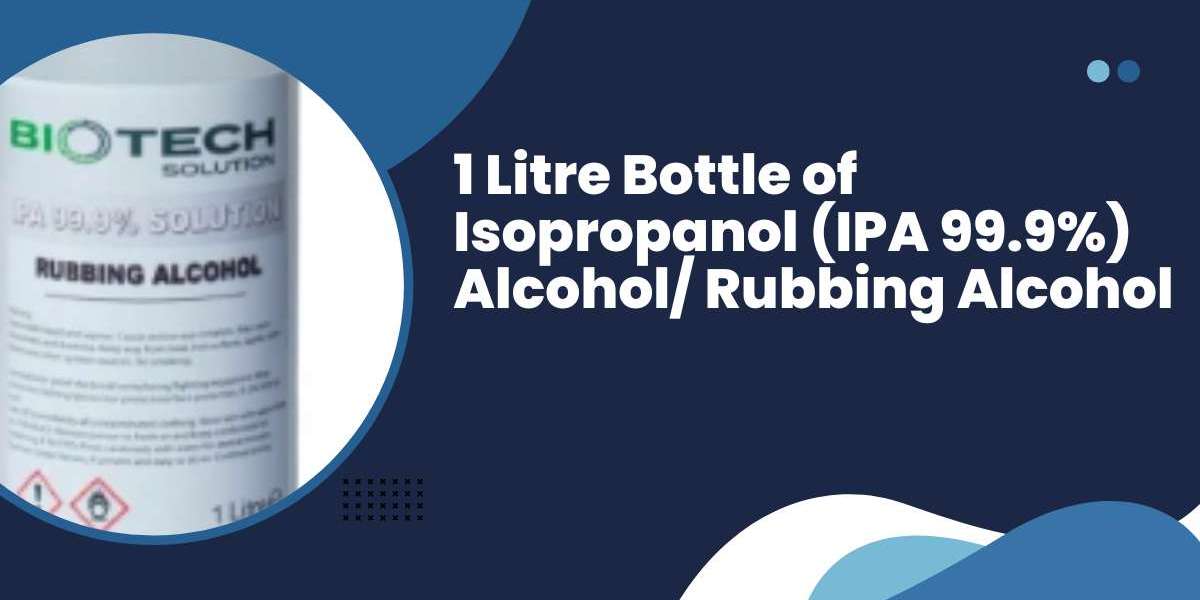Isopropyl alcohol is among the most versatile and widely used chemicals worldwide in homes, hospitals, and industries. Known for its disinfecting properties, isopropyl alcohol finds applications in cleaning, personal care, healthcare, and beyond. Its effectiveness and affordability make it a staple in various fields. Whether using it as a disinfectant, cleaner, or solvent, understanding the composition, benefits, and safety measures of isopropyl alcohol is essential.
Understanding Isopropyl Alcohol
What is Isopropyl Alcohol?
Isopropyl alcohol, or rubbing alcohol, is a colorless, flammable chemical compound with a strong odor. Belonging to the alcohol family, it consists of carbon, hydrogen, and oxygen atoms and has the chemical formula C₃H₇OH. It is highly effective against bacteria, viruses, and other pathogens, which makes it invaluable in many environments.
Chemical Composition of Isopropyl Alcohol
The molecular structure of isopropyl alcohol gives it unique characteristics. With a balanced formula of three carbons, eight hydrogens, and one oxygen atom, it is a stable yet reactive substance when mixed with water or other alcohol. This composition contributes to its ability to dissolve oils, kill germs, and evaporate quickly, leaving minimal residue.
How is Isopropyl Alcohol Made?
Isopropyl alcohol is generally produced by hydration, which combines water with propene, a byproduct of petroleum refining. This process can occur through indirect or direct hydration, creating a pure form of isopropyl alcohol ready for commercial use.
Isopropyl Alcohol in Everyday Life
Medical and First Aid Uses
In healthcare settings, isopropyl alcohol is a critical disinfectant for sanitizing medical instruments and surfaces. It's commonly found in hospitals as a topical antiseptic for cleaning wounds. Due to its effectiveness in killing bacteria and viruses, it's also used in hand sanitizers, where it's generally mixed at a 70% concentration for optimal germ-killing action.
Isopropyl Alcohol for Cleaning
For household and commercial cleaning, isopropyl alcohol is indispensable. From wiping down electronics to cleaning windows and mirrors, its quick-drying nature leaves surfaces streak-free. Moreover, it's an excellent solution for removing sticky residues, polishing stainless steel, and even being a degreaser in kitchens.
Skin and Beauty Uses
In cosmetics, isopropyl alcohol is a preservative ingredient in toners, makeup removers, and cleansing solutions. While it should be used carefully on the skin due to potential dryness, it is famous for its ability to remove oils and clear impurities.
Benefits of Isopropyl Alcohol
Benefits of Household Cleaning
The versatility of isopropyl alcohol in household cleaning is impressive. It not only disinfects surfaces but also dries quickly, reducing the risk of streaks and residue. Typical uses in the home include:
- Cleaning mirrors and glass
- Removing ink and sticky residues
- Deodorizing surfaces like countertops and sinks
Benefits in Health Care
In healthcare, isopropyl alcohol has been a standard antiseptic for years. Its ability to quickly kill germs makes it ideal for sanitizing medical instruments, hands, and surfaces in clinical settings. Studies show it can kill up to 99.9% of bacteria on contact, making it one of the most effective sanitizers.
Safety Guidelines for Using Isopropyl Alcohol
Safe Handling Tips
Handling isopropyl alcohol with care is essential. As a highly flammable substance, it should be used away from open flames or sources of heat. Wearing gloves and ensuring proper ventilation are good practices, especially when working with higher concentrations.
Proper Storage and Labeling
Store isopropyl alcohol in a cool, dry place away from direct sunlight. It should always be kept in a labeled container, preferably away from food or other chemicals, to avoid accidental ingestion or dangerous chemical reactions.
Dos and Don'ts of Using Isopropyl Alcohol
- Do dilute it appropriately for skin applications.
- Don't mix it with bleach, as this can produce toxic fumes.
- Do keep it out of reach of children and pets.
Comparing Isopropyl Alcohol to Other Alcohols
Isopropyl Alcohol vs Ethanol
While both isopropyl alcohol and ethanol are disinfectants, ethanol is often preferred in human consumption or ingesting products, such as hand sanitizers or alcoholic beverages. Isopropyl alcohol, however, is more commonly used for external cleaning due to its higher efficacy against pathogens.
Isopropyl Alcohol vs Rubbing Alcohol
Many people assume isopropyl alcohol and rubbing alcohol are the same, but they differ slightly. Rubbing alcohol is usually a mixture of isopropyl alcohol with water and other agents, and it's specifically intended for disinfecting skin or surfaces, whereas pure isopropyl alcohol has broader applications.
Using Isopropyl Alcohol as a Disinfectant
Effectiveness Against Germs
Isopropyl alcohol is a potent disinfectant with proven effectiveness against many viruses, bacteria, and fungi. Studies show that solutions containing 70% isopropyl alcohol are optimal for killing most pathogens without causing excessive drying or irritation to surfaces.
Best Concentrations for Disinfection
The concentration of isopropyl alcohol determines its effectiveness as a disinfectant. A 70% solution is most effective for general disinfection, while 99% is reserved for situations where rapid evaporation is needed, such as electronics.
Isopropyl Alcohol in Industrial Use
Industrial Cleaning Uses
Industries that require sterile environments, like pharmaceuticals and electronics, often rely on isopropyl alcohol for its disinfecting and quick-drying properties. It is used to clean machinery, lab equipment, and other surfaces where precision and cleanliness are paramount.
Electronics Manufacturing
In the manufacturing of electronics, isopropyl alcohol is invaluable. It cleans delicate circuit boards without leaving a residue, which is essential for maintaining electronic devices' integrity and performance.
Isopropyl Alcohol as a Solvent
Use in Laboratories
Due to its chemical stability and high evaporation rate, isopropyl alcohol is widely used in labs as a solvent for reactions and solutions. It's instrumental in DNA extraction processes and chemical testing, making it a valuable tool in research.
Importance in Paint and Ink Industry
Isopropyl alcohol is a critical ingredient in the formulation of paints, inks, and dyes, where it serves as a thinning agent. Its fast evaporation helps quick-drying, allowing products to maintain consistent color and application quality.
Environmental Impact of Isopropyl Alcohol
Biodegradability and Eco-friendly Usage
Isopropyl alcohol is biodegradable and breaks down quickly in the environment, making it relatively eco-friendly compared to other industrial chemicals. However, responsible usage and disposal are still essential to prevent ecosystem harm.
Disposal and Waste Management
Dispose of isopropyl alcohol according to local guidelines to prevent environmental contamination. Avoid pouring large quantities down the drain, as this can affect water systems and wildlife.
Health Concerns and Precautions
Skin Irritation
Prolonged exposure to isopropyl alcohol can cause dryness and irritation, particularly on sensitive skin. It's recommended to dilute it on the skin and avoid excessive contact.
Respiratory Effects
Inhaling isopropyl alcohol vapors can irritate the respiratory system. Ensure proper ventilation when using it indoors and avoid prolonged exposure to prevent symptoms like dizziness or headaches.
Frequently Asked Questions on Isopropyl Alcohol
What concentration of isopropyl alcohol is best for disinfecting surfaces?
A 70% solution is generally most effective for disinfecting surfaces.
Can isopropyl alcohol be used as a hand sanitizer?
Yes, but it should be diluted to 70% and used cautiously, as it can dry out the skin.
Is it safe to use isopropyl alcohol on electronics?
Yes, a 99% solution is often used on electronics since it evaporates quickly without leaving residue.
How should I store isopropyl alcohol safely?
Store it in a cool, dry place away from heat and direct sunlight, and keep it tightly sealed.
What's the difference between isopropyl alcohol and rubbing alcohol?
Rubbing alcohol is typically a diluted form of isopropyl alcohol, usually mixed with water or other additives.
Can isopropyl alcohol be used on the skin every day?
It's best to avoid daily use on the skin as it can cause dryness and irritation over time.
Conclusion
Isopropyl alcohol is a reliable and multifunctional compound across various sectors, from healthcare to industrial manufacturing. Its disinfecting power, ease of use, and affordability make it a staple in professional and home settings. However, like any chemical, it requires careful handling and respect for its safety guidelines to prevent harm. Whether you're using alcohol for cleaning, disinfecting, or as a solvent, understanding its applications and limits is critical to safe and effective use.







